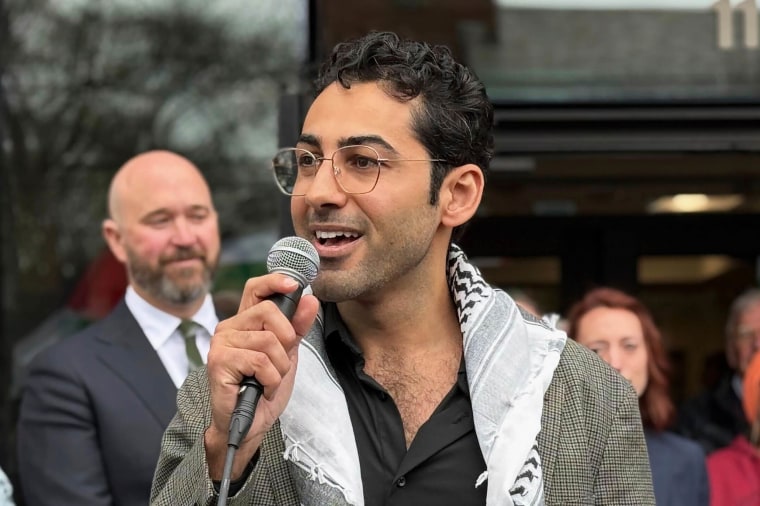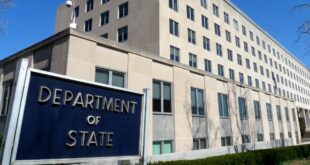
A lawyer for the federal government and an appeals judge got into a heated exchange Tuesday when the lawyer could not answer whether detained Tufts University student Rumeysa Öztürk’s free speech is protected.
Öztürk, who is from Turkey, was apprehended by immigration authorities on the streets of a Boston suburb on March 25.
The Trump administration revoked Öztürk’s student visa in late March based on an assessment from the Department of Homeland Security and Immigration and Customs Enforcement that she “had been involved in associations that ‘may undermine U.S. foreign policy by creating a hostile environment for Jewish students and indicating support for a designated terrorist organization.'”
Which included, according to a State Department memo, co-authoring an op-ed “that found common cause with an organization that was later temporarily banned from campus, the Bureau of Consular Affairs approved revocation, effectively immediately.”
Last year, Öztürk wrote an op-ed in her student newspaper that was critical of Tufts’ response to the war in Gaza.
During the hearing Tuesday at the 2nd Circuit Court of Appeals in New York City, Judge Barrington Parker Jr. asked the government whether they believed that Öztürk and Mahdawi’s speech was protected.
Justice Department attorney Drew Ensign said, “Your honor, we haven’t taken a position on that.”
“Help my thinking along,” Parker responded. “Take a position.”
Ensign replied: “I don’t have the authority to make those decisions. At the moment it’s not a live issue.”
Viral video of Öztürk’s arrest shows DHS officers and immigration authorities surrounding her on a sidewalk, grabbing her wrists and taking her off the street into a nearby SUV as she screamed.
She has been held in a detention center in Louisiana — thousands of miles from where she lives and was arrested — while she fights deportation.
Her lawyers have argued that the case should be transferred to Vermont, because it was the last place she was taken before she was transferred to Louisiana. U.S. District Judge William Sessions ordered Öztürk to be moved to Vermont earlier this month.
While in detention, Öztürk has been suffering asthma attacks.
“The dorm rooms in detention are very crowded, and the other women have reported seeing mice in the dorm rooms,” she wrote in a court filing on Monday. “Additionally, the air conditioning is running most of the day, and I do not have immediate access to fresh air.”
Simultaneously on Tuesday, the 2nd Circuit heard arguments on whether they should grant or deny another federal judge’s order to release Columbia University student Mohsen Mahdawi.
Mahdawi, a 34-year-old green card holder who was born and raised in a refugee camp in the West Bank, was detained by DHS agents on April 14 while being interviewed for his naturalization at a Vermont immigration office. He was released from prison on bail last week.

Ensign argued that Mahdawi shouldn’t remain free because it would interfere with the government’s ability to carry out his removal and lead to “technical challenges” and “operational costs” for the government.
Naz Ahmad, an attorney for Mahdawi, quipped that just a day after he was released, Mahdawi appeared remotely using Webex. Ahmad also argued that if Mahdawi were ordered to be detained again, it would chill his free speech.
“Liberty is the norm, and the government wants to disrupt that liberty,” Ahmad said.
Mahdawi was a key organizer of pro-Palestinian protests at Columbia last year. The Ivy League school became the epicenter of similar demonstrations at college campuses nationwide and drew the particular ire of Republicans on Capitol Hill.
The Trump administration justified his detention, arguing that his “presence and activities in the United States would have serious adverse foreign policy consequences and would compromise a compelling U.S. foreign policy interest,” according to the DHS notice for Mahdawi to appear.
Judge Geoffrey W. Crawford, of the Federal District Court in Vermont, ordered Mahdawi’s release on bail last week, comparing today’s political climate to the Second Red Scare of the 1950s.
“This is not the first time that the nation has seen chilling action by the government intended to shut down debate,” Crawford said.
Addressing reporters outside the courthouse last week after his release, Mahdawi struck a defiant tone.
“I am saying it clear and loud to President Trump and his Cabinet: I am not afraid of you,” he said
 Latest World Breaking News Online News Portal
Latest World Breaking News Online News Portal






